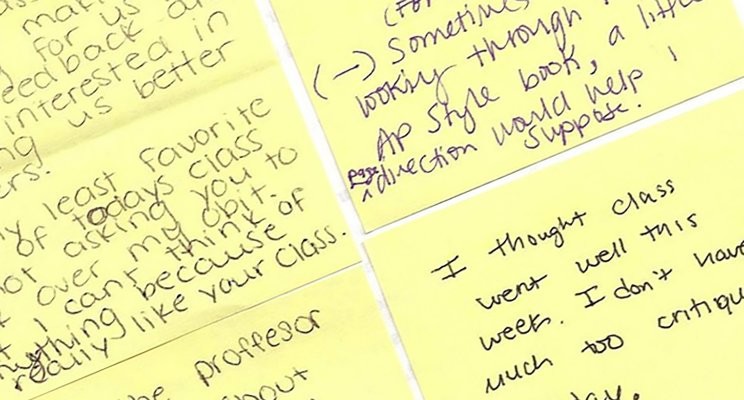
Sticky notes on improvement: How mini evaluations led to big insights for a first-time instructor
In the weeks leading up to my first college teaching experience, I explained my situation to others as one of excitement and terror.
Teaching an introductory news writing course in Penn State's College of Communications, I knew that a fulfilling exchange of knowledge awaited -- as well as a crushing obligation to not woefully prepare the next generation of reporters and PR professionals. It felt careless to wait until the formal mid-semester evaluation. Was I sage of journalism, stirring a passion for digging and delivering the news? Or was I floundering? I asked the students for feedback: weekly mini assessments, jotted down on Post-it notes. What I received kept confusion out of the excitement/terror mix.
Once a reminder to do something, the Post-it has become a means to uncover the things I didn't know needed done. Eight weeks into the semester, I have more than 90 stickies-worth of feedback.
As a graduate student in Penn State's higher education master's program, I borrowed this method from two of my professors: Karly Ford and Liliana Garces; who invited input as frequently as every session.
Students write what they like about the class at the top of the note and what they don't like, would improve or would like to learn more about at the bottom. They stick the notes to a desk on their way out of the classroom.
Once a reminder to do something, the Post-it has become a means to uncover the things I didn't know needed done.
Rather than create my own story for why a student blew off an assignment or continues to make a punctuation mistake -- they don't care, they think this class is a joke, etc. -- I have a fuller picture of what they're going through and empathy for the challenges they face. As one student wrote in the beginning, “I’ll do well if I get on the ball. I’ll be set." Several weeks in, one student said they're switching majors because "they don’t have a passion for journalistic writing," calling the realization a "good thing."
A few notes on getting the most out of mini evaluations.
Acknowledge the results
This doesn't necessarily mean upending the class in response to complaints, but you'll probably choose to make minor tweaks that would have never occurred to you at the beginning of the semester. During the session after evaluations, I address most of the complaints. Sometimes the response is a gentler version of "Because I said so." But, I've added additional information in the online course management system and incorporated mini lessons into each class addressing persistent problems and matters students want to hear more about. What's important is to let students know they've been heard.
Dwell on the positives
Inviting this sort of feedback can stir lots of anxiety. So it's important to steel yourself by dwelling a bit on the positives, to consider those comments validating that you're doing something right. Even if it's unrelated to academics -- one student wrote "I like your ties" -- don't dismiss these pick-me-ups.
Retain the input
After my weekly assessment, I stick the notes to a piece of paper and scan each page to maintain a PDF record of the feedback. Revisit the results throughout the semester to see if common gripes persist and can be addressed. Before planning for the next semester, reflect on what worked and what didn't last time. And be sure to set aside a few of those happy reminders that you've made an impact.
Be mindful of assessment fatigue
Each week, I hand out the blank Post-its with a bit of trepidation, worried that students are growing tired of the process. However, they continue to indulge my quest for feedback. I decided to give them a break by not seeking input through the optional, online mid-semester evaluation. (At the end of the semester, the formal online evaluation is mandatory and available for every student to complete.) If the students' notes grow more cursory, change the frequency of your input gathering.
Dubbed a "canary yellow phenomenon" by manufacturer 3M, I hope Post-it evaluations generate a remarkable bit of insight for you.
Bill Zimmerman is Penn State's social media manager and an adjunct instructor in the university's College of Communications.
Teaching Professor in the Department of Communication Arts and Sciences at The Pennsylvania State University
6yThanks Bill; I may steal this idea and make it my own!
professor at yangon university of education
8yGreat ! It is very true. Thanks for your sharing, Bill.
Digital marketer @ Toll Brothers | People-first leader with a passion for website design and creating efficiencies through project management
8yThis is the kind of thing that us Penn State World Campus folk are missing from the degree -- the face-to-face interactions, that is! I'm glad you shared the technique and your experience with it. Great use of Post-it's and even better takeaway!